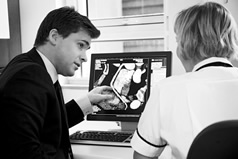Chest Pain / Discomfort
Heart Attack
If you think that you are having a heart attack call 999 now, you need urgent medical assessment by a healthcare professional. Time is muscle, the earlier you get help the less damage will be done to your heart and the greater your chance of a full recovery.
Acute Chest Pain
If your chest pain/discomfort is new, it is advisable to call either your doctor, NHS Direct (0845 4647) or an ambulance (999) immediately. Although there are many causes of chest pain, in order to detect a heart attack prior to significant damage being done to the heart you may need three simple procedures to be done.
- Clinical assessment by a health professional
- Electrocardiogram (ECG)
- Blood test for cardiac enzymes
Do not feel embarrassed about seeking help for your chest pain as cardiac chest pain is a life threatening condition. Other less serious conditions can mimic cardiac chest pain, however it is vital to be assessed by a healthcare professional to determine whether your pain is cardiac in origin.
Intermittent Chest Pain / Discomfort
Chest pain or chest discomfort may represent a serious underlying cardiac condition and therefore requires rapid investigation. Cardiac chest pain can present itself in a variety of ways. Classic cardiac chest pain is recognised as being a tight central chest discomfort that may radiate to the jaw, back or arms. This may occur on exertion or at rest and in more severe cases may be associated with nausea, sweating and breathlessness. Not all cardiac chest pain is so typical and any new chest, abdominal, throat or back discomfort should be taken seriously and medical advice should be sought. This is particularly important if there are associated risk factors such as raised blood pressure, raised blood cholesterol, diabetes, a family history of heart disease, and any history of smoking or illicit drug use.
With state-of-the-art technology it is usually now possible to determine the presence of coronary artery disease (dangerous narrowing of the blood vessels that take blood to the heart muscle) without an invasive test.
In the majority of cases, depending on one's individual risk, a combination of blood tests, an electrocardiogram (ECG), a cardiac ultrasound scan (echocardiogram/stress echocardiogram) and a cardiac CT scan (with calcium score) is sufficient to ascertain with a high degree of certainty whether there is underlying coronary artery disease. In some cases an exercise ECG is still used however this is being superseded by more accurate investigations listed above.
If one's risk of coronary artery disease is very high (>60%) then it may be most appropriate to proceed directly to having an invasive diagnostic coronary angiogram.
If a diagnosis of coronary artery disease is made then medical treatment can be immediately initiated and where necessary blood flow to the heart muscle restored with coronary angioplasty (stenting to narrowed coronary artery) or coronary artery bypass grafting (open heart surgery).
Dr Hickman sees private and NHS patients referred by their general practitioners and a referral letter is usually required. In exceptional circumstances, due to the urgent and unpredictable nature of cardiac complaints, Dr Hickman will offer urgent appointments to private patients without a referral letter. A full report will subsequently be sent to their GP.
